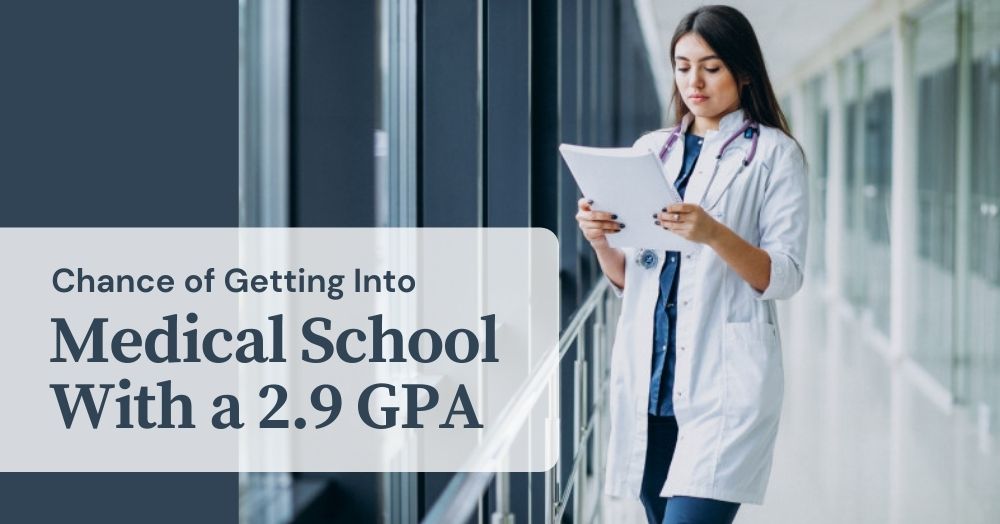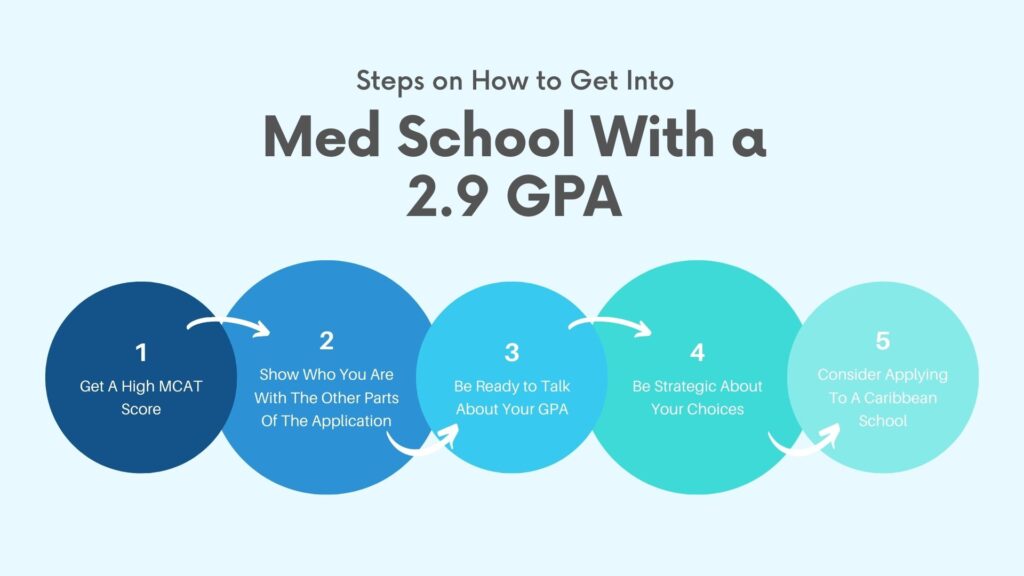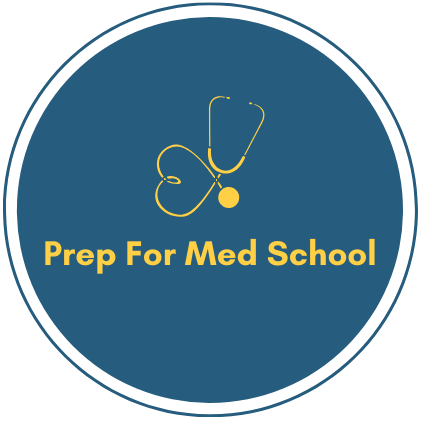Chance of Getting into Med School with a 2.9 GPA

It will be difficult, but not impossible, to get into medical school with a 2.9 GPA.
According to U.S. News 2019 Best Medical School rankings, the average median GPA was 3.72, and generally fell around 3.4 or higher.
While allopathic medical schools don’t have a minimum GPA requirement, they suggest maintaining a 3.0 GPA. Most students are recommended to strive for 3.5 and above. Lastly, both allopathic and osteopathic medical schools generally require students to achieve at least C’s (2.0) in their courses in order to matriculate.
According to official numbers, the probability of getting into medical school with a 2.9 GPA is 10 to 15.7% depending on your MCAT scores and whether you go the allopathic or osteopathic route. In the article below, we delve into the metrics and explain what you can do to increase your odds.
Table of Contents
What The Metrics Say
Instead of just us telling you, take a look at the data. According to AAMC numbers from 2017-2018 to 2019-2020, the overall acceptance rate of all allopathic medical school applicants with a GPA between 2.80 and 2.99 was 10.3%. The rates were stratified based on applicant MCAT scores.
The higher the MCAT score, the greater the relative likelihood of getting an acceptance was. With a GPA between 2.8 and 2.99, a 502-505 MCAT score had a 17.1% acceptance rate, 26.5% with a 510 – 513 MCAT score, and 41.4% with an MCAT score greater than 517.
Source: MCAT and GPA Grid for Applicants and Acceptees to U.S. Medical Schools, 2017-2018 through 2019-2020 (aggregated)
| 2.80-2.99 GPA | MCAT Score | 502-505 | 506-506 | 510-513 | 514-517 | Greater than 517 |
| Acceptance Rate | 17.1% | 23.4% | 26.5% | 28.4% | 41.4% |
In summary, the chances of being accepted into an allopathic medical school hover around 10% to 15% with a 2.9 GPA. For osteopathic schools, the percentage is a bit higher: 15.7% of 2017 admitted applicants had an overall GPA between 2.80 and 3.19.
A variety of factors may impact your chances including MCAT score, science GPA, experience, and so forth.
To analyze your chance of getting into medical school with your 2.9 GPA, use our LizzyM calculator that matches target schools with your GPA and MCAT.
How Can I Be More Competitive?
There isn’t a lot you can do that can quickly turn your GPA around, but there are things that can buff up your application.
Can I Do Anything About My GPA?
First, it’s important to figure out why you have a low GPA.
If you’re a college freshman or sophomore with a 2.9 GPA, don’t despair–it’s time to reflect and see what you can do to raise it. Reach out for help to create effective study plans. The important thing now is to show an upward trajectory. Furthermore, figuring out the weak links in your studying habits now will help you score better in harder science classes as an upperclassman. This will help you get a higher science GPA, show an upward trend, and show tenacity!
If you are a junior or senior, consider retaking a class or taking a post-baccalaureate program so that you can do better. Getting an A in a class you got a C in can show effort and speak volumes about your dedication. Otherwise, taking a gap year or two can be beneficial as well! Read on to see what you can do.
How Else Can I Buff Up My Application?
Say it’s too late about your GPA, what else can you do?
Medical schools also care about students’ passion for medicine. What better way to show them than clinical experience (or related extracurriculars)? You may consider taking a gap year or two to explore opportunities that will give you relevant healthcare exposure, like scribing or being a research assistant!
The median age of matriculants is in fact twenty four, which means many people have taken some time off before jetting off to med school.
Scribing (or medical assistant roles) is a popular choice for gap years because it allows students to gain shadowing experience, professional skills, letters of support, and an impactful personal statement–all while getting paid. Some other students may work as a research assistant at a lab to gain research experience, and maybe a publication or two.
You may even consider working as, for instance, a project coordinator for a non-profit you care about. What you get at the end of any experience will still be valuable. Medical schools also care about activities that can demonstrate key physician skills like empathy, communication, and teamwork.
If you have a low GPA, think about taking a gap year (or more!) pursuing activities that will spruce up your application.
Check out our article to make sure you have all your requirements in place along the way!
Should I Still Apply?
Simply based on the 2019 metrics, an offer from osteopathic schools may be more reasonable than from allopathic schools (15.7% vs 10.3%, respectively).
With a low GPA, it’s important to be strategic about your application. Students are still getting in…so not all hope is lost!
- Get A High MCAT Score
Getting a high MCAT score will exemplify your ability to overcome difficult tests and academic rigor. This may be able to balance a low GPA, as we can see from the 26.5% jump to a 41.4% acceptance rate when MCAT scores are above 517.
An excellent MCAT score goes a long way because your medical training will include a series of licensing exams such as Step 1, Step 2 CK, Step 2 CS, Step 3, and so forth. Schools want to know that you are not only interested in the content and can handle the rigor, but also able to tackle all those exams.
- Show Who You Are With The Other Parts Of The Application
The medical school application is more than just your transcript and MCAT: it also entails extracurricular activities, clinical experience, letters of recommendation, research experience, and other stuff (e.g. honors and awards).
Use these sections to highlight characteristics that make you a great addition to the student community and the future healthcare workforce. Make it so that schools want to offer you an interview. All you need to focus on right now is scoring an interview first.
- Be Ready to Talk About Your GPA
When you do get an interview, make sure you are able to talk about your low GPA. Medical schools that invite you for an interview already like what they see so now is your time to explain yourself if needed.
Were you dealing with something, like a family issue, that affected your grades? If you’re able to speak about it in a collected manner, it may even be a plus, and demonstrate your maturity in handling difficult situations and your communication skills.
- Be Strategic About Your Choices
A subpar GPA may make it difficult to apply to certain schools. Be realistic when constructing your list of target schools. Search online and use tools like the AAMC MSAR to help you stratify what schools are “far reaches,” “reaches,” or “targets.”
Using matriculant data will help you evaluate your chances. Think about other factors that may help you. For instance, in-state schools generally prefer to take in-state residents.
Remember, no matter which school you get into, you still end up with a degree and a license to practice. You are still a doctor. That’s all that matters.
- Consider Applying To A Caribbean School
Many students end up thinking about applying to a Caribbean medical school.
However, based on our research, graduates of Caribbean medical schools have a significantly lower residency match rate than graduates of DO/MD programs based in the United States. According to the 2020 NRMP Match Results and Data, residency match rates were roughly 30% lower for international medical graduates (IMGs).
Inform yourself about this choice before making a decision!

The Final Thought
Though the med school application covers so much more than just grades, the MCAT and your GPA (especially science GPA!) are paramount in getting an acceptance. Applying with a 2.9 GPA will not be impossible, but will definitely be very difficult.
However, if med school is your end goal, don’t lose hope. It may take a bit more time, but there are other ways to get into medical school!
What other questions do you have? Has this article helped you? Feel free to share and comment if so! Let us know what you think about this!
Related post: Your Chance of Getting Into Med School With a 3.2 GPA

Leave a Reply